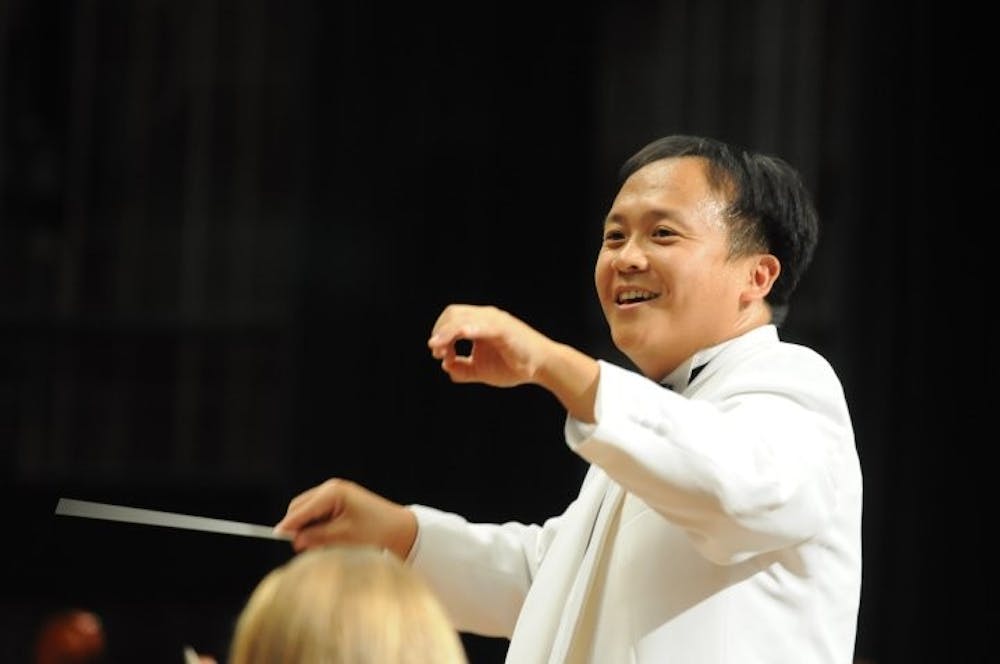“As a conductor, you’re responsible to teach the students or teach the orchestra what you want to express, so you’re really at the mercy of the instrumentalists, your orchestra,” Thomas Hong says. “How do you convince them? How do you challenge them and motivate them without turning them off? That’s the challenge of being a conductor. You don’t have your own voice. You’re mute. You have to sort of help them to allow you to speak.”
Thomas Hong is the dedicated conductor of Penn’s Symphony Orchestra. Hong admits, however, that he didn’t always have the same diligent work ethic he has today.
“Me being the youngest of the three siblings, no one really taught me to study or to be focused,” Hong says. “My siblings did take care of me, but they were trying to figure things out on their own. That kind of added to the lazy mentality.”
His parents, however, were first generation immigrants to the States and were anything but lazy. They moved their family of five to Philadelphia in 1978, when Hong was only six. Without the ability to speak fluent English, they started street vending merchandise, such as bags and modest jewelry, on Chestnut and Broad Streets.
“Sometimes, they woke up at 4 a.m. to get the best location, only to open at 9 a.m. And then they came home at 8 p.m. If it was the holidays, they’d come home at 10 p.m.,” Hong says. “That’s the kind of gritty background that I come from.”
Hong describes how during his college years, something “clicked,” and his days of laziness came to a grinding halt. He credits his parents for inspiring an example of work ethic he felt he must also live up to.
“Having observed their lifestyle, it impacted the rest of my life,” Hong says. “Almost immediately, I was like, ‘No more lazy, I gotta be them. I gotta be better than them,’” Hong says. “They didn’t have the advantage of speaking English fluently. They achieved this much. I need to achieve so much more, so they could feel like their efforts were not in vain.”
After graduating from Cairn University in 1995, Hong attended the prestigious Curtis Institute of Music located in the Rittenhouse neighborhood of Philadelphia, where he studied conducting. He notes that famous musicians such as Leonard Bernstein are also Curtis alums.
More importantly to Hong, however, the Curtis Institute is also where he met his wife. He adds that his wife is one of the most talented, but also one of the most humble, people he has ever met. He believes she is the youngest person to ever have received a spot to join the world class Philadelphia Symphony Orchestra, which she joined at age nineteen.
“She’s very even tempered and very mild. She doesn’t have an inflated view of herself,” Hong says. “That’s why I can’t think too well of any achievements, because she sets a great example in showing modesty.”
While Hong never brags about his accomplishments in the slightest, his list of brag–worthy accolades is extensive. He has held positions with the Dallas, Pittsburgh, and Seattle Symphony Orchestras, and the Orchestre National de France in addition to conducting countless concerts of various genres across the country.
He explains that the majority of these accomplishments occurred right after graduating from the Curtis Institute. He says he spent that time focusing on developing his career and was in a long–distance relationship with his then girlfriend and now wife during those years.
After they decided to get married and have a child, however, Hong knew immediately that long distance would no longer work for their family. When, his four–year–old daughter, Esther, was born, Hong moved back to Philadelphia to start their growing family.
Thus came the next piece of Hong’s extensive career. He has been the conductor for the Penn Symphony Orchestra for the last four years, and he raves about the exceptionally talented students he works with.
“Being one of the larger Ivy League institutions, you can imagine, just by the virtue of volume, the kind of talent we draw in,” Hong says. “There is a saying from China: Even if you’re one in a million, there’s still a thousand of you. Just by the sheer size of our institution, we enjoy the most talented students, the highest caliber students. So we have a fantastic orchestra.”
Hong describes that one of the greatest challenges of being a conductor is harnessing that talent without discouraging the students who are still navigating how to balance orchestra with the rest of their lengthy list of commitments at Penn. Hong adds that another challenge is the fact that many students simply do not know that Penn even has a symphony orchestra. He accredits this to the “business of the culture,” as well as the pre–professional atmosphere.
While Hong would love more people to know about the Penn Symphony Orchestra, Hong says that it is key to inspire the students to strive for excellence for themselves instead of just for the sake of a sizable audience.
“Sometimes you just pursue greatness and great things will happen,” Hong says. “You don’t have to worry about the things that you can’t control.”







